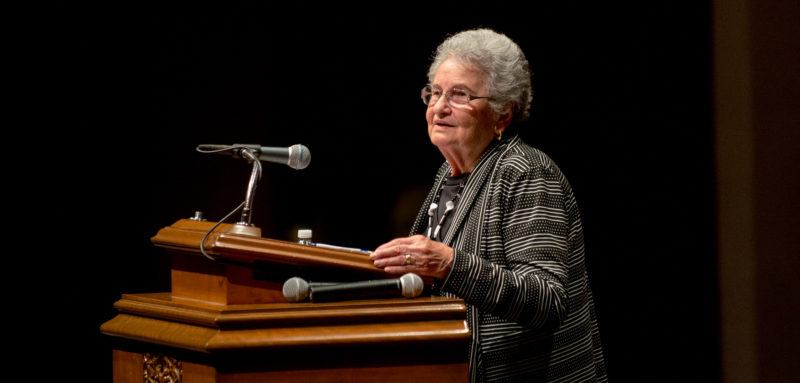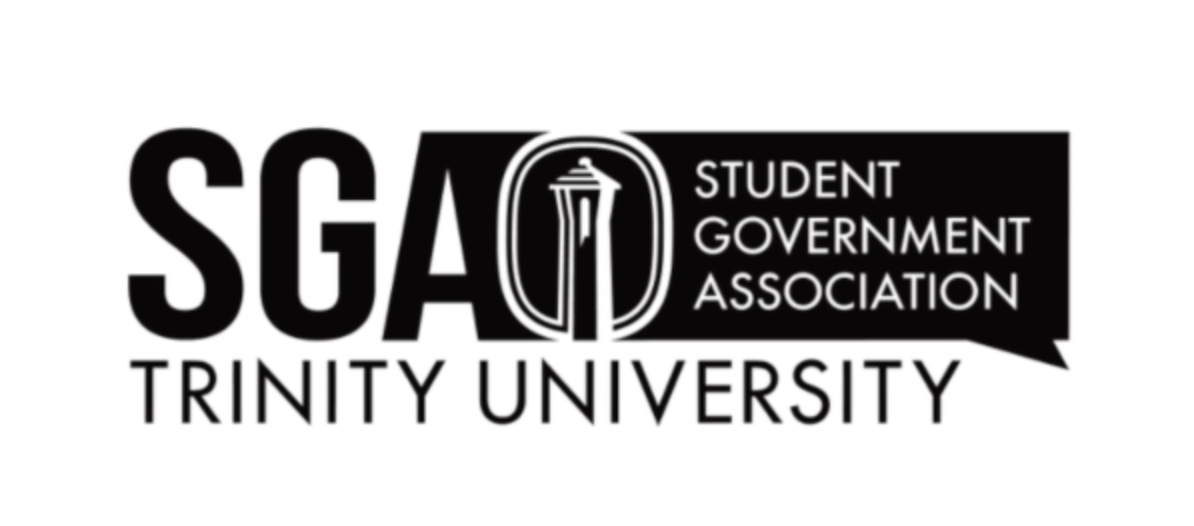Anna Rado, a Holocaust survivor and San Antonio resident, gave a lecture in Laurie Auditorium on Monday at 7 p.m. The event was open to the public; roughly 150 people were in attendance.
After Rado spoke about her time in Auschwitz and her experience of losing most of her family members, she spoke about her gratitude and desire to spread a positive message.
“After all the things I went through, I am still very blessed that I can stand in front of you and tell you I have children, I have grandchildren,” Rado said. “I always tell the children when I talk to them to never give up, and don’t hate. I’m really feeling very thankful that there are still some people who are interested in the Holocaust and the memory of it.”
Rado’s lecture was organized by Trinity’s Jewish Students Association-Hillel (JSA-Hillel) organization.
Ashley Lachterman, junior business administration major and co-president of JSA-Hillel, helped with promoting the lecture and spoke about Rado’s lecture in an interview prior to the event.
“This is not the first Holocaust survivor I’ve heard speak, but every single one I’ve heard speak has been in a different kind of setting. I’ve had encounters with people that are more one-on-one, I’ve gone to panels, I’ve gone to meet-and-greet style at the Holocaust museum in D.C., but this is definitely a different experience,” Lachterman said. “I think because everyone’s story is so different, [Rado’s] story is going to be different from somebody else’s, especially because she was a child when she went through it.”
Lachterman was also excited to see the feedback from the Trinity community following the lecture.
“Since I’ve been at Trinity, we haven’t really had anything Holocaust-related that’s been open to the whole university and the public as well. I think it’s really important to talk about. The whole purpose of having Holocaust survivors speak and share their stories and their experiences is that we don’t forget what happened,” Lachterman said. “That’s the whole Holocaust Remembrance Day message. We shouldn’t forget the stories, we shouldn’t forget what happened. That’s why we have museums and everything.”
Lachterman explained that it’s especially important for her to remember the Holocaust because she is Jewish.
“It holds a lot more weight for me,” Lachterman said. “To meet anybody who’s gone through it is a gift. I really appreciate anything that they do. Having to speak about it and almost relive it just by speaking on it takes a lot of strength.”
Chad Spigel, associate professor of religion and faculty advisor for the JSA-Hillel group on campus, reflected on the opportunity to have such a lecture take place.
“The Holocaust is one of the most tragic events of the 20th century and it is important that we learn about these horrible atrocities to honor those who were murdered, but also to make sure that we do everything possible to prevent similar events from taking place in the present and in the future,” Spigel wrote in an email interview. “As time passes “” the Holocaust took place over 70 years ago “” opportunities to hear from survivors who experienced the horrors of the Nazis become fewer and fewer.”
Spigel also explained how unique this opportunity was for the Trinity community.
“It is an opportunity that we may not have again in the future,” Spigel wrote. “References to the Holocaust are often followed by commands to “˜never forget.’ I think it is important for the Trinity community to attend and to listen to Anna Rado tell her story, and then to never forget.”
Ruth Lavenda, senior psychology major and programming intern at Hillel San Antonio, and Grace Cline, sophomore psychology and religion double major and co-president of the JSA-Hillel chapter at Trinity, both helped organize Rado’s lecture.
“The Trinity board of JSA-Hillel has been working hard to get the word out about the event, and I have been doing a lot of the behind-the-scenes work in order to make sure everything is set,” Lavenda wrote in an email interview. “Having a Holocaust survivor speak at Trinity is a unique and rare experience.”
Lavenda also highlighted the importance of educating the Trinity community about the Holocaust.
“What makes it so significant is that most people have not had the chance to hear the personal perspective from someone who experienced it firsthand,” Lavenda wrote. “I am also glad that we are able to provide the Trinity and San Antonio community with this once-in-a-lifetime experience.”
Cline believes that the lecture is important for several reasons.
“This is an opportunity that we won’t have within the next decade or so; we are really the last generation that will get to speak to a Holocaust survivor directly and receive a firsthand account,” Cline wrote in an email interview.
Cline also believes that as Holocaust survivors begin to pass away, it will become easier to distance ourselves from the Holocaust as an event.
“In reality, the Holocaust is fairly modern and it’s important for people to understand that and receive a firsthand account. Being with a Holocaust survivor is humbling and different than simply learning about the Holocaust so I feel very lucky that we’re bringing that opportunity to our community.”
Molly Malkemus, a first-year student who attended the lecture, went because she thought it would be interesting to hear from someone who survived the Holocaust.
“It’s one of those things that you know happened, but you don’t really think about it,” Malkemus said. “To hear someone’s story who was actually there and went through it and lost everyone was really interesting.”
For more information about JSA-Hillel or to get involved, contact the San Antonio Hillel Director at ayancelson@hillelsa.org.





